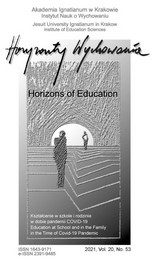Pandemia COVID-19 i (nie)wykorzystany potencjał edukacyjny
The COVID-19 Pandemic and the (Un)used Educational Potential
Author(s): Dorota PaulukSubject(s): Health and medicine and law, Family and social welfare, Sociology of Education, Distance learning / e-learning, Pedagogy
Published by: Uniwersytet Ignatianum w Krakowie
Keywords: COVID-19; students; family; remote education;
Summary/Abstract: RESEARCH OBJECTIVE: Based on the results of Polish and international research, the aim of the article is to show how the changes caused by the COVID-19 pandemic, related to the closure of schools and remote education, have reorganized the educational and family environment, influencing the functioning of children and adolescents. THE RESEARCH PROBLEM AND METHODS: The article is a review. By discussing the results of the research, I try to answer the question: what are and what may be the consequences of closing schools and remote education in various dimensions of the functioning of children and adolescents? THE PROCESS OF ARGUMENTATION: In the first part, I focus on the short- and longterm consequences of school closure and remote education, primarily in the area of teaching-learning. In the second part, I refer to day by day functioning of children, adolescents, their parents/carers, and related to, among others, with the quality of mutual relations or the level of well-being. RESEARCH RESULTS: The research results indicate the exclusion from the education system of students who had an unfavorable educational situation before the pandemic. The new model of education negatively affected the psychological well-being of children, adolescents and their parents/carers, creating a fertile ground for the development of e.g. parental stress, domestic violence. There have also been positive effects of remote education, including better functioning and more effective learning of selected groups of students. CONCLUSIONS, INNOVATIONS, AND RECOMMENDATIONS: Education systems lack solutions that would effectively prevent the exclusion of numerous groups of students. In the long run, this will contribute to deepening economic and social disproportions in the world. Developing fairer and more inclusive education remains a priority. School closure and remote education negatively affected the mental health of students and their parents. There is an urgent need to create systemic solutions and define new priorities in education that take into account the needs of people affected by the effects of the pandemic.
Journal: Horyzonty Wychowania
- Issue Year: 20/2021
- Issue No: 53
- Page Range: 39-48
- Page Count: 10
- Language: Polish

